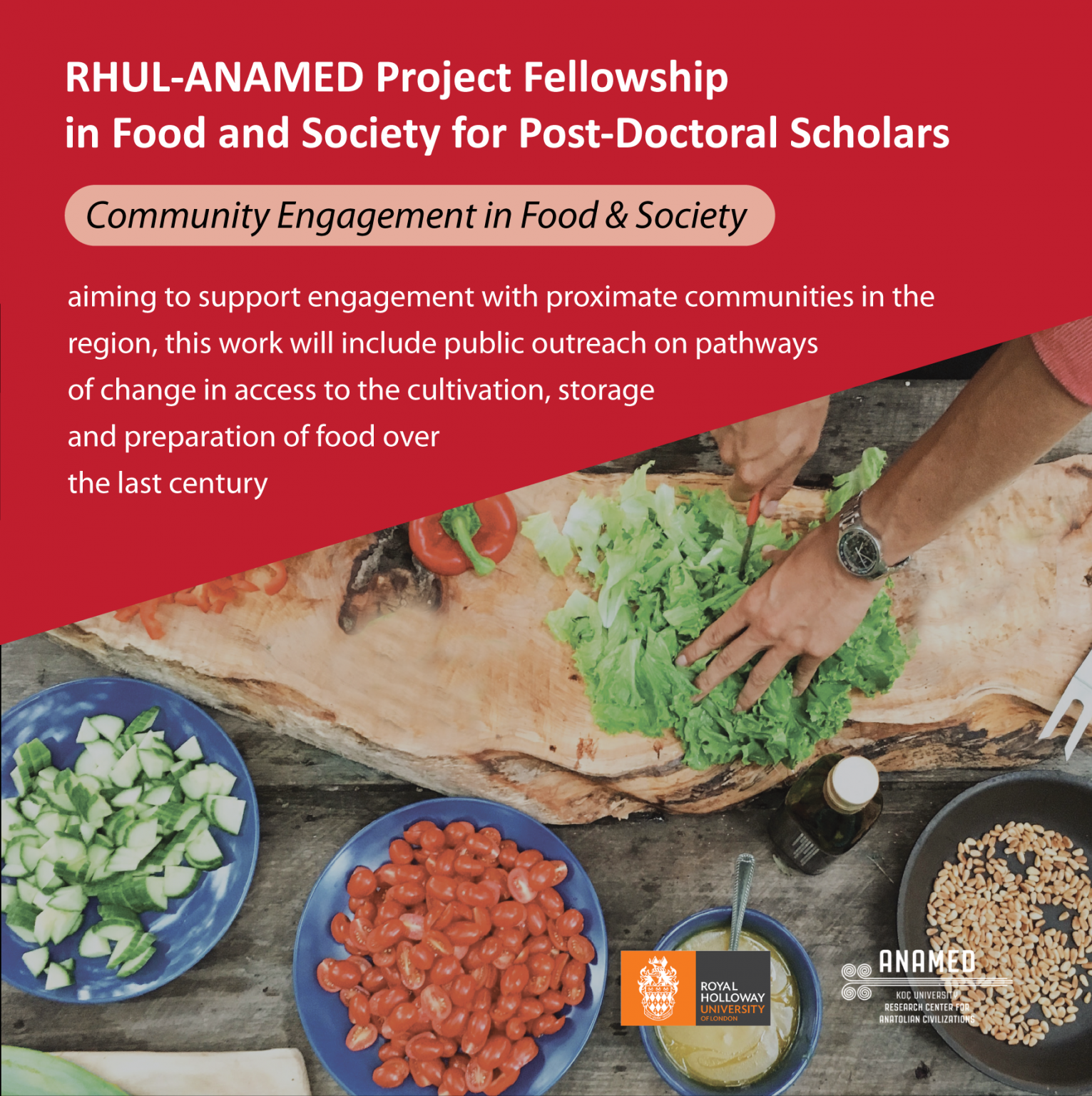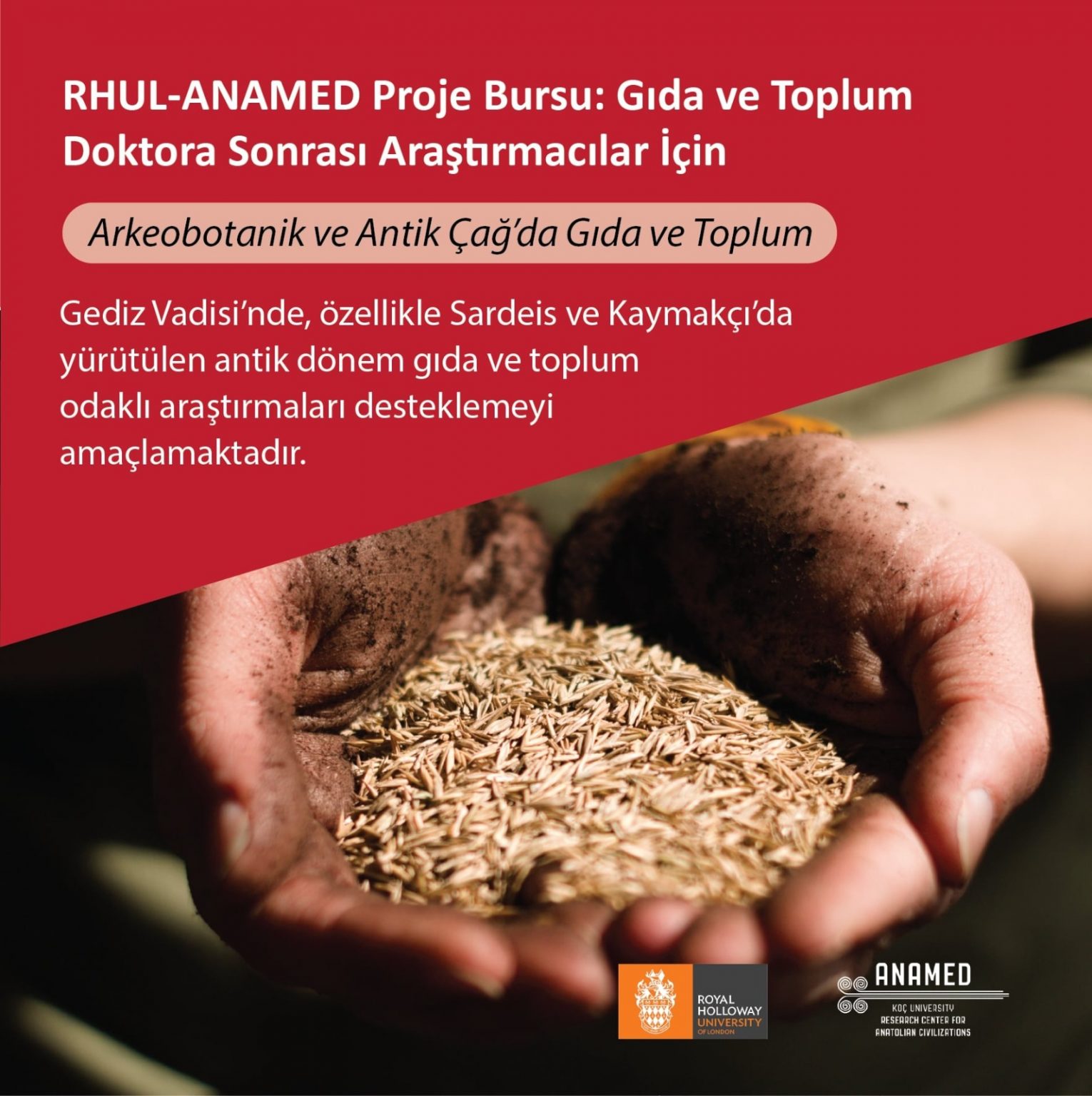Royal Holloway, University London (RHUL) and Koç University Research Center for Anatolian Civilizations invite applications for two post-doctoral scholars to support activities under the UK Arts & Humanities Research Council grant, “Negotiating the Modernity Crisis: Globalization, economic gain and the loss of traditional and sustainable food practices in Türkiye” (AHRC AH/V000454/1). Details of the project can be found here. The fellowships will focus on food and society, particularly pathways past to present. The results will be presented in an exhibition held in Istanbul and cookbook published by Koç University Press, as well as more traditional academic publications. The region of interest is the Gediz Valley of western Türkiye and specifically datasets and research in partnership with the Kaymakçı Archaeological Project and the Archaeological Expedition of Sardis. The primary responsibility of the fellowship holders will be to support this broad research strategy and work with Principal Investigator, Erica Rowan at Royal Holloway, and the Co-Principal Investigator, Christina Luke at Koç University.
Post-Doctoral Fellowship 1: Community Engagement in Food & Society
This fellowship aims to support engagement with proximate communities in the region. This work will include public outreach on pathways of change in access to the cultivation, storage and preparation of food over the last century. In addition to academic research on the topic, the post-doc will organize and develop cooking workshops. The results from this work will be featured in the exhibition at ANAMED as well as the cookbook. The fellow will be involved in content and design development of these two outputs. In addition, the fellow is expected to collaborate with and support the other fellow in their research.
Successful applicants will have a strong combination of the following qualifications:
- Good first degree and a doctorate in a relevant subject area (archaeobotany, archaeology, archaeological science) (or clear evidence that completion of such a doctorate is imminent) with publications and participation in scholarly activity commensurate with stage of career
- Experience undertaking archaeobotanical research and analysis (the candidate must have experience floating, sorting and identifying material)
- Experience working with excel, access or other database software or a willingness to learn
- Experience teaching or working with undergraduate students
- Archaeological fieldwork experience
- Have a general understanding of environmental archaeology and an interest in food and society
- Demonstrated interpersonal, organizational, and collaborative skills for working within teams;
- Ability to work independently and to prioritize multiple, simultaneous projects;
- Ability to communicate effectively (written and spoken) in English with project-related researchers as well as Koç University faculty, administration, staff, and students; Working proficiency in Turkish is welcome;
- Flexibility in work schedule, as needed, including full availability for fieldwork in the summer at Sardis (May – August) and some time at Kaymakçı;
- No military obligations.
The successful applicant will be provided a fellowship stipend commensurate with experience, health benefits, a research account, and other benefits associated with the ANAMED community such as library and events access.
The position will be one year full-time. Primary residency must be in Istanbul or the province of Manisa or Izmir. The successful applicant will be ready to start the one-year fellowship on 1 January 2022. Renewal thereafter is contingent on project progress and available funding.
Required application materials include;
(1) an application letter detailing the applicant’s relevant experience and motivation to win a fellowship;
(2) a Curriculum Vitae; and
(3) the names and emails of two referees familiar with the applicant’s experience. Up to two relevant publications or writing samples are welcome, also. Applicant materials must be submitted via email to erica.rowan@rhul.ac.uk. Application files should be saved as MSWord or PDF files, with filenames containing the applicant’s last name.
Post-Doctoral Fellowship 2: Archaeobotany, Food & Society in Antiquity
This fellowship aims to support research focused on food and society in antiquity as represented in the Gediz Valley, especially at Sardis and Kaymakçı. In addition to an expertise in paleo-ethnobotany, the scholar will engage with research about food, cultivation and preparation as represented in ancient texts (translations are sufficient) and various aspects of material culture broadly related to food and society in the past. The post-doctoral fellow will be responsible for developing one hybrid course on the topic. The fellow will be involved in content related to the exhibition and cookbook. In addition, the fellow is expected to collaborate with and support the other fellow in their research.
Successful applicants will have a strong combination of the following qualifications:
- Good first degree and a doctorate in a relevant subject area (archaeobotany, archaeology, archaeological science) (or clear evidence that completion of such a doctorate is imminent) with publications and participation in scholarly activity commensurate with stage of career
- Experience undertaking archaeobotanical research and analysis (the candidate must have experience floating, sorting and identifying material)
- Experience working with excel, access or other database software or a willingness to learn
- Experience teaching or working with undergraduate students
- Archaeological fieldwork experience
- Have a general understanding of environmental archaeology and an interest in food and society
- Demonstrated interpersonal, organizational, and collaborative skills for working within teams;
- Ability to work independently and to prioritize multiple, simultaneous projects;
- Ability to communicate effectively (written and spoken) in English with project-related researchers as well as Koç University faculty, administration, staff, and students; Working proficiency in Turkish is welcome;
- Flexibility in work schedule, as needed, including full availability for fieldwork in the summer at Sardis (May – August) and some time at Kaymakçı;
- No military obligations.
The successful applicant will be provided a fellowship stipend commensurate with experience, health benefits, a research account, and other benefits associated with the ANAMED community such as library and events access.
The position will be one year full-time. Primary residency must be in Istanbul or the province of Manisa or Izmir. The successful applicant will be ready to start the one-year fellowship on 1 January 2022. Renewal thereafter is contingent on project progress and available funding.
Required application materials include;
(1) an application letter detailing the applicant’s relevant experience and motivation to win a fellowship;
(2) a Curriculum Vitae; and
(3) the names and emails of two referees familiar with the applicant’s experience. Up to two relevant publications or writing samples are welcome, also. Applicant materials must be submitted via email to erica.rowan@rhul.ac.uk. Application files should be saved as MSWord or PDF files, with filenames containing the applicant’s last name.




